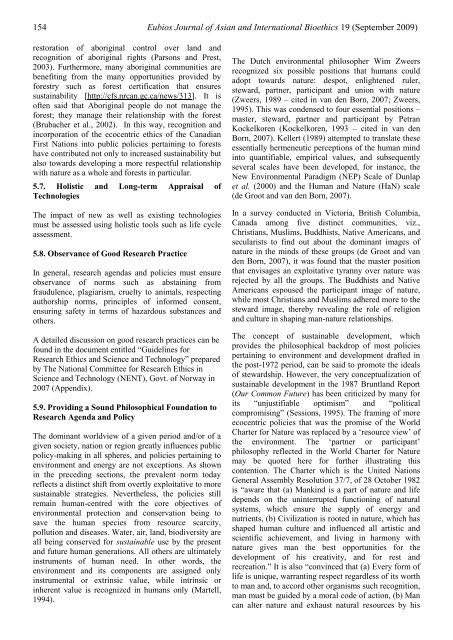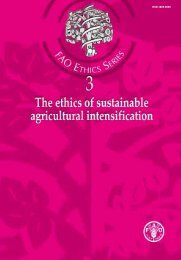Eubios Journal of Asian and International Bioethics EJAIB
Eubios Journal of Asian and International Bioethics EJAIB
Eubios Journal of Asian and International Bioethics EJAIB
Create successful ePaper yourself
Turn your PDF publications into a flip-book with our unique Google optimized e-Paper software.
154 <strong>Eubios</strong> <strong>Journal</strong> <strong>of</strong> <strong>Asian</strong> <strong>and</strong> <strong>International</strong> <strong>Bioethics</strong> 19 (September 2009)<br />
restoration <strong>of</strong> aboriginal control over l<strong>and</strong> <strong>and</strong><br />
recognition <strong>of</strong> aboriginal rights (Parsons <strong>and</strong> Prest,<br />
2003). Furthermore, many aboriginal communities are<br />
benefiting from the many opportunities provided by<br />
forestry such as forest certification that ensures<br />
sustainability [http://cfs.nrcan.gc.ca/news/313]. It is<br />
<strong>of</strong>ten said that Aboriginal people do not manage the<br />
forest; they manage their relationship with the forest<br />
(Brubacher et al., 2002). In this way, recognition <strong>and</strong><br />
incorporation <strong>of</strong> the ecocentric ethics <strong>of</strong> the Canadian<br />
First Nations into public policies pertaining to forests<br />
have contributed not only to increased sustainability but<br />
also towards developing a more respectful relationship<br />
with nature as a whole <strong>and</strong> forests in particular.<br />
5.7. Holistic <strong>and</strong> Long-term Appraisal <strong>of</strong><br />
Technologies<br />
The impact <strong>of</strong> new as well as existing technologies<br />
must be assessed using holistic tools such as life cycle<br />
assessment.<br />
5.8. Observance <strong>of</strong> Good Research Practice<br />
In general, research agendas <strong>and</strong> policies must ensure<br />
observance <strong>of</strong> norms such as abstaining from<br />
fraudulence, plagiarism, cruelty to animals, respecting<br />
authorship norms, principles <strong>of</strong> informed consent,<br />
ensuring safety in terms <strong>of</strong> hazardous substances <strong>and</strong><br />
others.<br />
A detailed discussion on good research practices can be<br />
found in the document entitled “Guidelines for<br />
Research Ethics <strong>and</strong> Science <strong>and</strong> Technology” prepared<br />
by The National Committee for Research Ethics in<br />
Science <strong>and</strong> Technology (NENT), Govt. <strong>of</strong> Norway in<br />
2007 (Appendix).<br />
5.9. Providing a Sound Philosophical Foundation to<br />
Research Agenda <strong>and</strong> Policy<br />
The dominant worldview <strong>of</strong> a given period <strong>and</strong>/or <strong>of</strong> a<br />
given society, nation or region greatly influences public<br />
policy-making in all spheres, <strong>and</strong> policies pertaining to<br />
environment <strong>and</strong> energy are not exceptions. As shown<br />
in the preceding sections, the prevalent norm today<br />
reflects a distinct shift from overtly exploitative to more<br />
sustainable strategies. Nevertheless, the policies still<br />
remain human-centred with the core objectives <strong>of</strong><br />
environmental protection <strong>and</strong> conservation being to<br />
save the human species from resource scarcity,<br />
pollution <strong>and</strong> diseases. Water, air, l<strong>and</strong>, biodiversity are<br />
all being conserved for sustainable use by the present<br />
<strong>and</strong> future human generations. All others are ultimately<br />
instruments <strong>of</strong> human need. In other words, the<br />
environment <strong>and</strong> its components are assigned only<br />
instrumental or extrinsic value, while intrinsic or<br />
inherent value is recognized in humans only (Martell,<br />
1994).<br />
The Dutch environmental philosopher Wim Zweers<br />
recognized six possible positions that humans could<br />
adopt towards nature: despot, enlightened ruler,<br />
steward, partner, participant <strong>and</strong> union with nature<br />
(Zweers, 1989 – cited in van den Born, 2007; Zweers,<br />
1995). This was condensed to four essential positions –<br />
master, steward, partner <strong>and</strong> participant by Petran<br />
Kockelkoren (Kockelkoren, 1993 – cited in van den<br />
Born, 2007). Kellert (1989) attempted to translate these<br />
essentially hermeneutic perceptions <strong>of</strong> the human mind<br />
into quantifiable, empirical values, <strong>and</strong> subsequently<br />
several scales have been developed, for instance, the<br />
New Environmental Paradigm (NEP) Scale <strong>of</strong> Dunlap<br />
et al. (2000) <strong>and</strong> the Human <strong>and</strong> Nature (HaN) scale<br />
(de Groot <strong>and</strong> van den Born, 2007).<br />
In a survey conducted in Victoria, British Columbia,<br />
Canada among five distinct communities, viz.,<br />
Christians, Muslims, Buddhists, Native Americans, <strong>and</strong><br />
secularists to find out about the dominant images <strong>of</strong><br />
nature in the minds <strong>of</strong> these groups (de Groot <strong>and</strong> van<br />
den Born, 2007), it was found that the master position<br />
that envisages an exploitative tyranny over nature was<br />
rejected by all the groups. The Buddhists <strong>and</strong> Native<br />
Americans espoused the participant image <strong>of</strong> nature,<br />
while most Christians <strong>and</strong> Muslims adhered more to the<br />
steward image, thereby revealing the role <strong>of</strong> religion<br />
<strong>and</strong> culture in shaping man-nature relationships.<br />
The concept <strong>of</strong> sustainable development, which<br />
provides the philosophical backdrop <strong>of</strong> most policies<br />
pertaining to environment <strong>and</strong> development drafted in<br />
the post-1972 period, can be said to promote the ideals<br />
<strong>of</strong> stewardship. However, the very conceptualization <strong>of</strong><br />
sustainable development in the 1987 Bruntl<strong>and</strong> Report<br />
(Our Common Future) has been criticized by many for<br />
its “unjustifiable optimism” <strong>and</strong> “political<br />
compromising” (Sessions, 1995). The framing <strong>of</strong> more<br />
ecocentric policies that was the promise <strong>of</strong> the World<br />
Charter for Nature was replaced by a „resource view‟ <strong>of</strong><br />
the environment. The „partner or participant‟<br />
philosophy reflected in the World Charter for Nature<br />
may be quoted here for further illustrating this<br />
contention. The Charter which is the United Nations<br />
General Assembly Resolution 37/7, <strong>of</strong> 28 October 1982<br />
is “aware that (a) Mankind is a part <strong>of</strong> nature <strong>and</strong> life<br />
depends on the uninterrupted functioning <strong>of</strong> natural<br />
systems, which ensure the supply <strong>of</strong> energy <strong>and</strong><br />
nutrients, (b) Civilization is rooted in nature, which has<br />
shaped human culture <strong>and</strong> influenced all artistic <strong>and</strong><br />
scientific achievement, <strong>and</strong> living in harmony with<br />
nature gives man the best opportunities for the<br />
development <strong>of</strong> his creativity, <strong>and</strong> for rest <strong>and</strong><br />
recreation.” It is also “convinced that (a) Every form <strong>of</strong><br />
life is unique, warranting respect regardless <strong>of</strong> its worth<br />
to man <strong>and</strong>, to accord other organisms such recognition,<br />
man must be guided by a moral code <strong>of</strong> action, (b) Man<br />
can alter nature <strong>and</strong> exhaust natural resources by his

















